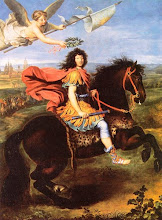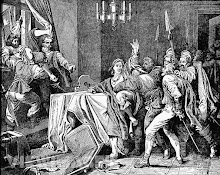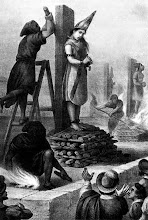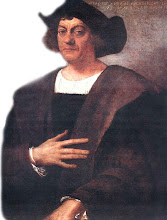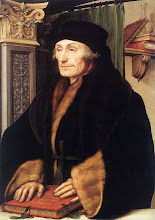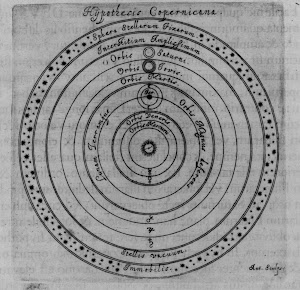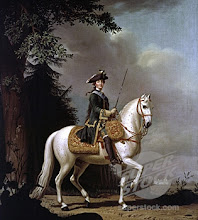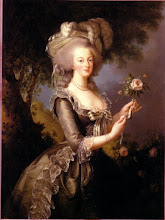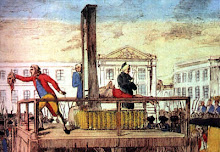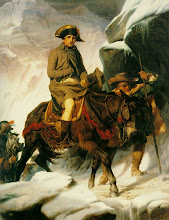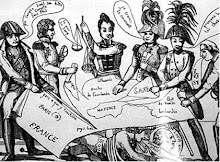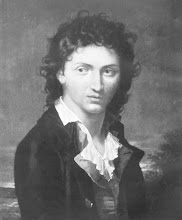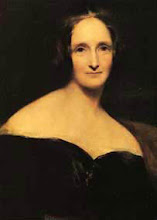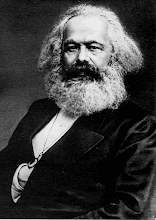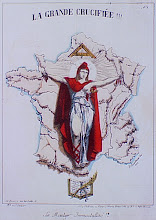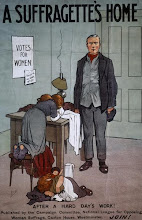 How does the emotionalism of this passage relate to enlightened thinkers' fascination with the passions and the workings of human reason? Did eighteenth-century religious thinkers and religious practices accept or reject new enlightened ideas about human nature and behavior? How would Voltaire have responded to Wesley and his revivalism? Why did Wesley hold such large, outdoor religious meetings, and what might the establishment church have thought about this? (page 497)
How does the emotionalism of this passage relate to enlightened thinkers' fascination with the passions and the workings of human reason? Did eighteenth-century religious thinkers and religious practices accept or reject new enlightened ideas about human nature and behavior? How would Voltaire have responded to Wesley and his revivalism? Why did Wesley hold such large, outdoor religious meetings, and what might the establishment church have thought about this? (page 497)Thursday, December 18, 2008
“The Conversion Experience in Wesley's Methodism”
 How does the emotionalism of this passage relate to enlightened thinkers' fascination with the passions and the workings of human reason? Did eighteenth-century religious thinkers and religious practices accept or reject new enlightened ideas about human nature and behavior? How would Voltaire have responded to Wesley and his revivalism? Why did Wesley hold such large, outdoor religious meetings, and what might the establishment church have thought about this? (page 497)
How does the emotionalism of this passage relate to enlightened thinkers' fascination with the passions and the workings of human reason? Did eighteenth-century religious thinkers and religious practices accept or reject new enlightened ideas about human nature and behavior? How would Voltaire have responded to Wesley and his revivalism? Why did Wesley hold such large, outdoor religious meetings, and what might the establishment church have thought about this? (page 497)Friday, November 7, 2008
“A Witchcraft Trial in France”
 What does this document tell us about the spread of witchcraft persecutions in the seventeenth century? What does this document tell you about the legal procedures involved in the trial of witches and how might these procedures have worked to condemn the innocent? What do these passages tell you about early modern European conceptions of justice? What does the trial record suggest about the status of women in the seventeenth century? (page 412)
What does this document tell us about the spread of witchcraft persecutions in the seventeenth century? What does this document tell you about the legal procedures involved in the trial of witches and how might these procedures have worked to condemn the innocent? What do these passages tell you about early modern European conceptions of justice? What does the trial record suggest about the status of women in the seventeenth century? (page 412)
Friday, October 31, 2008
Las Casas and the Spanish Treatment of the American Natives
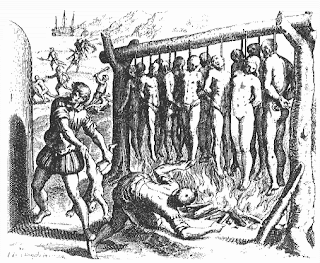
"[The Spaniards] took babies from their mothers' breasts, grabbing them by the feet and smashing their heads against rocks. ... They built a long gibbet, low enough for the toes to touch the ground and prevent strangling, and hanged thirteen [natives] at a time in honor of Christ Our Savior and the twelve Apostles. ...Then, straw was wrapped around their torn bodies and they were burned alive."
In what ways did this account help to create the image of teh Spaniards as "cruel and murderous fanatics?" What motives may have prompted Las Casas to make this critique and how might his opinions affect the broader standing of Spain in global politics of the era? Did his criticisms of early Spanish rule have any impact? If so, what? (p. 390)
Monday, October 13, 2008
"A Reformation Debate: The Marburg Colloquy"
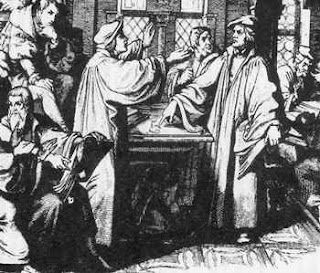 What is the issue being debated by Luther and Zwigli? What would have been the Catholic Church's position if Catholic representatives had been included in the debate? Based on this example, why do you think the Reformation debates led to further hostility rather than the compromise and unity between relitious and sectarian opponents? (page 359)
What is the issue being debated by Luther and Zwigli? What would have been the Catholic Church's position if Catholic representatives had been included in the debate? Based on this example, why do you think the Reformation debates led to further hostility rather than the compromise and unity between relitious and sectarian opponents? (page 359)Thursday, September 25, 2008
EXTRA CREDIT POST: “A Woman’s Defense of Learning”
 How does Laura Cereta explain her intellectual interests and accomplishments? Why were Renaissance women rarely taken seriously in their quest for educational opportunities and recognition for their intellectual talents? Were any of those factors unique to the Renaissance era? Can Cereta be described as a “feminist”? Why or why not? (page 329)
How does Laura Cereta explain her intellectual interests and accomplishments? Why were Renaissance women rarely taken seriously in their quest for educational opportunities and recognition for their intellectual talents? Were any of those factors unique to the Renaissance era? Can Cereta be described as a “feminist”? Why or why not? (page 329)
Wednesday, September 24, 2008
Machiavelli: "Is It Betther to be Loved than Feared?"
 What does Machiavelli have to say about being loved rather than feared? How do his theories in this regard make his politics modern and distinguish his advice from Greco-Roman notions of good rulership? Are Machiavelli’s comments in the excerpt at all relevant to today’s democratic politics? (page 325)
What does Machiavelli have to say about being loved rather than feared? How do his theories in this regard make his politics modern and distinguish his advice from Greco-Roman notions of good rulership? Are Machiavelli’s comments in the excerpt at all relevant to today’s democratic politics? (page 325)Monday, September 8, 2008
“A Feminist Heroine: Christine de Pizan or Joan of Arc”
Subscribe to:
Posts (Atom)
